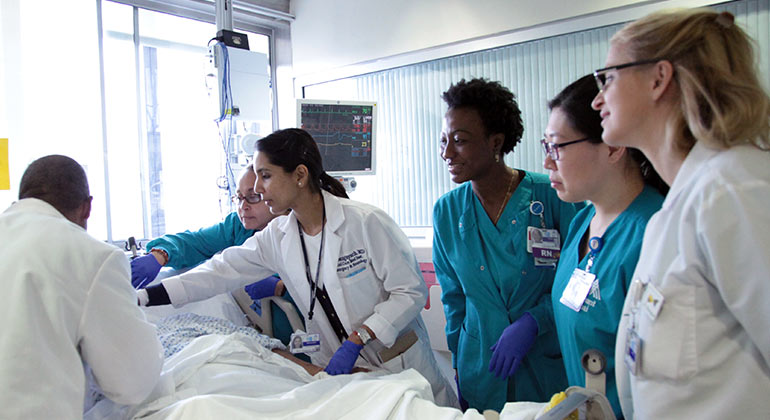- Home
- Visiting in the ICU
ICU Visitors
Visiting a loved one in Intensive Care is not like a typical hospital visit.
ICU visitors should try to develop a relaxed attitude when in the room. This is not always easy.
Often the patient will not be able to respond because of sedation, being on a ventilator or the nature of their illness.
They may be surrounded by various monitors and machines. The ICU can at times be noisy, busy and with many people all hard at work.
Do not be intimidated. Everyone is there to help your loved one.
What Should I be Doing When I Visit in the ICU?
Early on, try to plan a schedule of when you will come and how long you will stay. Being at the hospital is not your normal day. It's wearing.
Most everyone wants to be present as much as possible. This will wear you down and you'll be no good to anyone including your loved one.
Critically ill patients need rest. So do you. Breaks throughout the day will keep you in better shape for whatever might come.
Make time for yourself, even if just getting the mail and checking on everything at home.
How Should I Deal with the Nurses?

The ICU nurse will spend more time than anyone else. They will bathe, clean up and be sure your loved is not in pain or agitated.
They watch everything and will call the doctor if they suspect any problem.
For you, the nurses are your best friend. They will keep you informed about everything that is going on.
They will tell you, all you need to know about the ICU and the hospital and how your loved one is doing.
Help the nurses to learn about your loved one as a real person. His or her likes and dislikes. What kind of work they do or did do.
Bring pictures, cards, drawings from family or friends. Hang them on the wall.
Don't forget glasses and hearing aids. If they like music bring in a headset. TV? Put on their favorite program even if they do not appear to be watching.
Let the nurses know your loved one's most comfortable and uncomfortable positions while in bed.
If you have copies of Living Wills or Advanced directives bring them to the nurses to put in the hospital record.
If problems develop with a specific nurse, discuss it with the Head Nurse.
Avoid getting into a fight with anyone.
ICU nurses have seen it all. They want to help you as much as they want to help your loved one.
How About the Doctors?

In many units, different doctors will come by throughout the day. They may be consultants to help with a specific problem or the ICU doctors.
Sometime they may forget to talk to you; but don't be shy about asking questions. Almost all are happy to tell you what they think, and what they are doing.
If residents are part of the team, they can be helpful. Just remember they are inexperienced and will not have all the answers.
The Attending ICU doctor is the head of the team and he or she should know all that is going on.
The more people you ask questions of, the more answers you'll receive and the more likely they will not all agree. Stick with the ICU Attending doctor.
If you are there early enough in the morning you could ask to listen to rounds. They can be very technical for the ICU visitor.
Usually before leaving the team can quickly tell you what it all means and what they think is happening.
ICU Rules
COVID 19 has caused numerous changes for visiting your loved one. Now days. gowns, gloves, masks and more may be necessary. The nurses will let you know and show you what's needed.
For COVID patients visiting may be severely limited or not allowed at all. Often telephone or video visits can be arranged.
Dependent on the hospital and ICU, for now, limited visiting may be in effect for the non Covid patients
Wash your hands before and after every visit. This is very important.
If you or another ICU visitor do not feel well; it's probably best not to come that day.
Try to follow the visiting hours and ask before entering the room.
Some intensive care units allow family present for procedures. If this becomes an issue, talking with the Head Nurse and the doctor will usually work it out.
If you are not comfortable watching, just leave the room until everything is done.